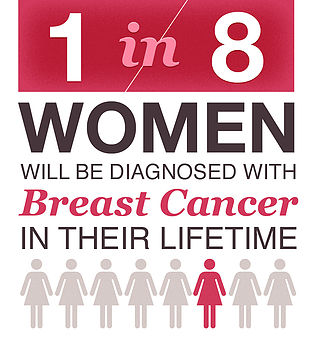What African American Women Should Know:

Did You Know These USA Facts:
- One in eight women will be diagnosed with breast cancer in their lifetime.
- Breast cancer is the most commonly diagnosed cancer in women.
- Breast cancer is the second leading cause of death among women.
- Each year it is estimated that over 220,000 women in the United States will be diagnosed with breast cancer and more than 40,000 will die.
- Although breast cancer in men is rare, an estimated 2,150 men will be diagnosed with breast cancer and approximately 410 will die each year.
Source: http://www.nationalbreastcancer.org/breast-cancer-facts
Breast cancer tends to appear in Black women at a younger age and in more advanced forms. In fact, Black women are two times more likely to develop triple negative breast cancer, an aggressive form of the disease which has fewer effective treatment options.
Triple-negative breast cancers tend to grow and spread more quickly than most other types of breast cancer. We also are known to have denser breast, one of the strongest predictors of risk for breast cancer and also is a known factor limiting the sensitivity of a screening mammogram. Mammograms of breasts with higher density have been described as harder to read and interpret than those of less dense breasts. A small cancer can be concealed by dense breast tissue or by the overlap of normal breast structures.
Many women with early breast cancer have no symptoms. That is why it is so crucial to get screened before symptoms have a chance to appear. However, the most common sign of breast cancer is a new lump or mass. A painless, hard mass that has irregular edges is more likely to be cancerous, but breast cancers can be tender, soft, or rounded. For this reason, it is important that you have any new breast mass or lump checked by a health care professional experienced in diagnosing breast diseases.
Other signs may include:
- Swelling of all or part of the breast
- Skin irritation or dimpling,
- Pain in the breast or nipple
- Thickening of the nipple or breast
- Discharge other than breast milk
Source: http://www.bwhi.org/issues-and-resources/black-women-and-breast-cancer/
